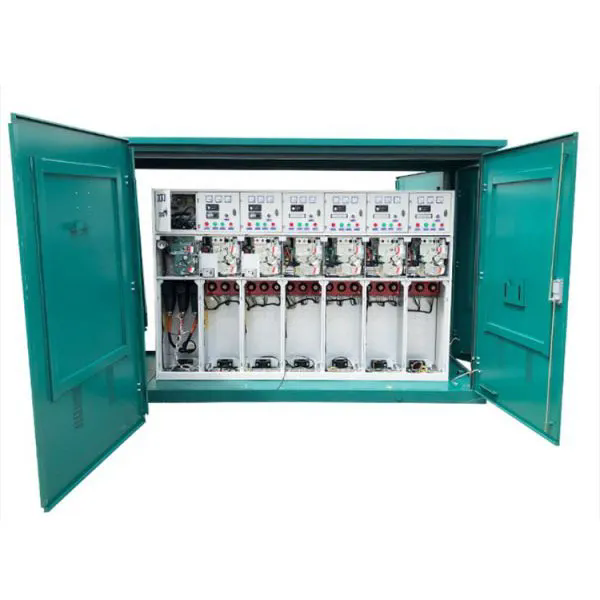What Makes Ring Main Units Essential for Modern Electrical Distribution Systems?
2024-11-06
In the realm of electrical distribution, efficiency and reliability are paramount. Among the technologies that enhance these attributes, the Ring Main Unit (RMU) stands out as a crucial component. But what exactly is a Ring Main Unit, and why is it essential for modern electrical systems? Let’s explore the key features, benefits, and applications of RMUs to understand their significance in contemporary power distribution networks.
1. What Is a Ring Main Unit?
A Ring Main Unit is a type of switchgear used in electrical distribution networks, typically designed for medium voltage applications. It functions by connecting multiple incoming and outgoing power sources in a looped configuration, providing a reliable method for distributing electricity to various loads. This design enhances the flexibility and resilience of electrical networks, making RMUs a popular choice in urban and industrial settings.
2. How Does a Ring Main Unit Work?
The operational principle of a Ring Main Unit is straightforward yet effective. The unit comprises several components, including circuit breakers, switches, and transformers, all housed in a compact enclosure. Power flows into the RMU and can be directed to multiple outgoing lines, forming a ring circuit. This configuration allows for multiple supply routes, ensuring that if one line fails, power can still be supplied from another direction, enhancing the reliability of the system.
3. What Are the Key Benefits of Using RMUs?
The advantages of employing Ring Main Units in electrical distribution are numerous. One of the primary benefits is their ability to improve system reliability. The ring configuration allows for redundancy, which minimizes the risk of outages. Additionally, RMUs are designed to be compact and modular, making them suitable for space-constrained environments. Their ease of installation and maintenance also contributes to overall operational efficiency.
4. Why Is Reliability Important in Electrical Distribution?
In any electrical distribution system, reliability is crucial for ensuring uninterrupted power supply. This is especially important for critical infrastructure, such as hospitals, data centers, and manufacturing facilities. By incorporating RMUs, operators can enhance the reliability of their systems, providing peace of mind and reducing the likelihood of costly downtime due to outages.
5. In What Applications Are Ring Main Units Commonly Used?
Ring Main Units are widely used across various industries and applications. They are particularly prevalent in urban electrical distribution networks, where they facilitate the efficient delivery of power to residential and commercial buildings. RMUs are also utilized in industrial settings, renewable energy installations, and utility substations, where their reliability and flexibility are essential.
6. How Do RMUs Contribute to Safety in Electrical Systems?
Safety is a paramount concern in any electrical distribution system, and RMUs are designed with this in mind. The enclosed design of Ring Main Units protects operators from live electrical components, reducing the risk of accidental contact. Furthermore, many RMUs are equipped with advanced protection features, such as fault detection and automatic isolation, which enhance the safety of the overall system.
7. What Role Do RMUs Play in Modern Smart Grids?
As the push for smart grid technologies continues, Ring Main Units are evolving to integrate with advanced monitoring and control systems. Modern RMUs can be equipped with smart sensors that provide real-time data on system performance and health, allowing for proactive maintenance and improved decision-making. This integration is crucial for optimizing energy distribution and enhancing the resilience of electrical networks.
8. How Do RMUs Compare to Traditional Switchgear?
Compared to traditional switchgear, Ring Main Units offer several distinct advantages. The ring configuration of RMUs allows for greater flexibility in power distribution, while their compact design makes them more suitable for urban environments. Additionally, RMUs often incorporate modern features that enhance safety and monitoring capabilities, setting them apart from conventional switchgear solutions.
9. Why Should Utilities Consider Upgrading to RMUs?
For utility companies and electrical engineers, the decision to upgrade to Ring Main Units can lead to significant improvements in reliability, safety, and operational efficiency. As electrical demands increase and the complexity of power distribution grows, RMUs provide a solution that meets modern requirements while offering the flexibility needed for future expansion and upgrades.
10. What Is the Future of Ring Main Units in Electrical Distribution?
The future of Ring Main Units appears promising, especially with the ongoing advancements in smart grid technologies and renewable energy integration. As the demand for reliable and efficient power distribution continues to rise, RMUs will play a pivotal role in meeting these challenges. Their adaptability and resilience make them well-suited for the evolving landscape of electrical distribution.
Conclusion: Are Ring Main Units the Backbone of Reliable Power Distribution?
In summary, Ring Main Units are essential components of modern electrical distribution systems. Their unique design, reliability, and safety features make them a preferred choice for utilities and industries alike. As we move towards smarter and more efficient energy systems, RMUs will undoubtedly continue to play a vital role in ensuring the reliable delivery of power. If you are involved in electrical distribution, considering the implementation of Ring Main Units could be a strategic decision to enhance your system's resilience and efficiency in the years to come.



